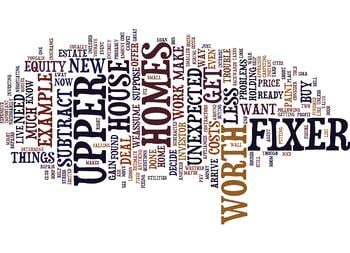Not everyone’s idea of a dream home is the same. Some buyers look for a home that they can buy, move into, and not have to put a lot of extra effort into. Others may find their dream home is in need of some tender loving care. If a brand-new home is out of your price range, purchasing a fixer-upper might be the right choice. But how do you go about qualifying for a mortgage, making a down payment, and finding the money for those renovations? Many believe their only option is to wait to build equity in the home and then take out a home equity loan. Or perhaps you think you might take more time to save and then refinance your home. While those are viable options, financing options for your fixer upper available.
There are two types of home renovation loans to consider. The first is the Fannie Mae HomeStyle Renovation Mortgage, and the second type if the Federal Housing Administration’s 203(k) Mortgage.
The Fannie Mae HomeStyle Renovation Mortgage is a fairly well-known loan for home improvements.
It allows the borrower to purchase a house in need of repair or refinance their already existing home to cover renovations.
You can use the money for any number of projects, including repairs, renovations, remodeling or energy efficiency improvements.
While this mortgage is available through any Fannie Mae-approved lender, there are specific requirements.
- A down payment of at least 5% is necessary for a single-family home.
- You must have a credit score of at least 620.
- The lender will oversee all work and your lender must receive copies of all renovation plans and the renovation contract.
- The contractor has 12 months from the closing date to complete the work.
Investors can also apply for the HomeStyle Renovation Mortgage; however, lenders require 15% down versus the 5% required for residual purchases.
While the total amount of money approved for renovations can be up to 50% of what the property is anticipated to appraise for after renovations are complete, the money earmarked for the renovations (versus the cost of the home itself) is put into a separate escrow account and paid to the contractor directly.
The Federal Housing Authority offers two types of FHA 203(k) loans.
These loans are the Limited FHA 203(k) (previously known as Streamline) and the Standard FHA 203(k) (previously known as Full or Regular).
These FHA loans are ideal for borrowers who have limited funds for a down payment and/or slightly lower credit scores. Though lender requirements may vary, you can have a credit score as low as 500 if you are able to put down 10%.
The Standard 203(k) loan allows for almost any type of renovation project on your home, whether it’s a remodeling project or demolition of the original structure.
With this loan, the homeowner must hire a 203(k) consultant to oversee the project from start to finish. If you are unable to live in your home while the renovations are taking place, you will be able to hold off on six months of mortgage payments during the renovation process. Speak to your lender for details.
Some guidelines and coverage specifications with the Standard 203(k) are:
- The home must be at least one year old.
- Repair costs must be at least $5000.
- Foundations must remain in place, however repairs to the foundation may be made.
- Repairs or removal of existing in-ground pools (no pool installations)
- Repair of septic systems
The Limited 203(k) loan is available for less extensive renovation projects. With this loan:
- You are eligible to borrow the cost of the home plus up to $35,000 for repairs and renovations.
- There are no minimum amount requirements.
- This loan is perfect for those needing to repair or replace roofs, gutters, cooling system, etc.
You may also use the money to remodel kitchens and bathrooms, knock down walls or add insulation.
As long as the renovation does not include structural modification, the Limited 203(k) is an option worth considering.
If considering a home renovation mortgage, make sure to work with a lender who is well versed in this style of mortgage and let them assist you through the process. These mortgages are much more complex than the standard residential fixed-rate mortgage and an experienced lender will be able to assist you with knowing who to hire for contractors and getting your project paid for.

